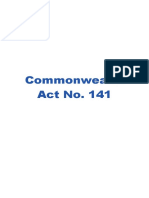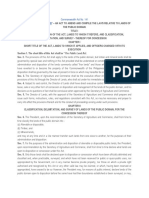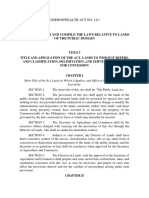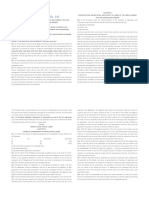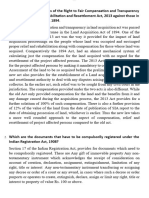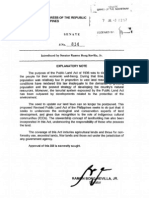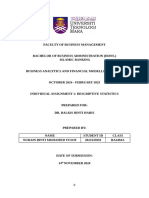Family Law 2 Final Project
Family Law 2 Final Project
Uploaded by
ampi9071Copyright:
Available Formats
Family Law 2 Final Project
Family Law 2 Final Project
Uploaded by
ampi9071Original Title
Copyright
Available Formats
Share this document
Did you find this document useful?
Is this content inappropriate?
Copyright:
Available Formats
Family Law 2 Final Project
Family Law 2 Final Project
Uploaded by
ampi9071Copyright:
Available Formats
LAND LAW
ACADEMIC YEAR 2022 – 2023
NAME: - AMAN SINGH
SUBJECT: - Family Law II
TOPIC: - Irretrievable Breakdown of the Marriage
SUBMITTED TO: - Dr. A.K. Singh & Asst. Prof. Ms. Jayoti Karmokar
CLASS / DIV / ROLL NO. Fourth Year BLS / L.L.B, B – 20
THAKUR RAMNARAYAN COLLEGE OF LAW 1
LAND LAW
Nistar Patrak
Nistar Land
Nistar refers to the necessities in the carrying on of the business of living. Land set apart for
exercise of nistar rights may be timber or fuel reserve; pasture, grass, bir or fodder reserve; burial
ground and cremation ground; gaodhan or village site; encamping ground; threshing floor;
bazaar (market); skinning ground; manure pit; public purposes such as schools, playgrounds,
parks, lanes, drains; and any other purposes that may be prescribed. Nistar lands consisted of tree
cover categorised as nistari van (open forest), malguzari/zamindari van (forests on land owned
by zamindars and malguzars, revenue van, bade jhad ke jungle, chote jhad ke jungle, ghas
(grass), charnoi (grazing) and charagah (pasture).
Nistar Patrak
Nistar land is communal land and the nistar patrak provides in particular
a) the terms and conditions on which grazing the cattle in the village shall be permitted;
b) the terms and conditions on which and the extent to which any resident may obtain wood,
timber, fuel or any other forest produce; and mooram (type of soil), kankar (type of soil), sand,
earth, clay, stones or any other minor minerals.
Survey
A survey is an operation carried out to bring the records of an area upto date and pertains to
revision or correction of field maps, division of land into survey numbers, recording of old
survey numbers and power to re-number or sub-divide survey numbers, groupings of villages to
form tehsils or districts and preparation of record rights of an area.
Patta
Patta is a land revenue record which establishes the title/ ownership of land. The patta register is
maintained at the Tehsil office and contains ownership details of all land holdings.
Patwari
The patwari is in charge of keeping the records at the village level. This person maintains land
records, statistical data, and land measurements of the village. She or he could be holding records
of one to four villages, a cluster called a halka. The patwari is the interface between the
landholder and the state revenue department. The work of the patwari is supervised by the
revenue inspector, who is the next highest functionary. A revenue inspector’s circle may contain
80 to 90 villages, grouped into 15 to 19 patwari circles.
THAKUR RAMNARAYAN COLLEGE OF LAW 2
LAND LAW
Patwari Maps
Maps of the village maintained by the Patwari are patwari maps.
Preparation of Nistar Patrak
The Collector shall consistently with the provisions of this Code and the rules made thereunder,
prepare a Nistar Patrak embodying a scheme of management of all unoccupied land in a village
and all matters incidental thereto, and more particularly the matters specified in section 162.
A draft of the Nistar Patrak shall be published in the village and after ascertaining the wishes of
the residents of the village in the manner determined by the Collector. it shall be finalised by the
Collector. Matters to be provided for in Nistar Patrak (S. 162]
The following matters shall be provided in a Nistar Patrak, that is to say-
(a) the terms and conditions on which grazing of cattle in the village will be permitted.
(b) the terms and conditions on which and the extent to which any resident of the village may
obtain- (i) wood, timber, fuel or any other forest produce; (ii) moram, kankar, sand, earth, clay,
stones or any other minor minerals
(c) instructions regulating generally the grazing of cattle and removal of articles mentioned in
paragraph (b) Provision in Nistar Patrak for certain matters [S. 163]
Section 163 provides that in preparing a Nistar Patrak the Collector shall, as far as possible,
make provision for-
(a) free grazing of the cattle used for agriculture;
(b) removal free of charge by the residents of the village for their bona fide domestic
consumption of any
(i) forest product
(ii) minor minerals;
(c) the concessions to be granted to the village craftsmen for the removal of articles specified in
clause (b) for the purpose of their craft Right in waste land of another village.
Where the Collector is of the opinion that waste land of any village is insufficient and it is the
public interest to proceed under this section, he may after such enquiry as he deems fit, order that
the residents of the village shall have a right of Nistar or a right of grazing cattle, as the case may
be, in the neighbouring village to the extent specified in the order.
Punishment for contravention of provisions
THAKUR RAMNARAYAN COLLEGE OF LAW 3
LAND LAW
Any person who acts in contravention of the provisions in sections 161 to 166 or rules made
under section 166 or who contravenes or fails to observe any rules or custom entered in the
Wajib-ul-arz or commits a breach of any entry entered in the Nistar Patrak shall be liable to such
penalty not exceeding rupees one thousand as the Collector may, after giving such person an
opportunity to be heard, deem fit. The Collector may further order confiscation of any produce,
or any other produce which such person may have appropriated or removed from lands
belonging to the State Government.
WAJIB-UL-ARZ
As soon as may be after this Code comes into force, the Collector shall, JI according to any
general or special order made by the State Government in that behalf, ascertain and record the
customs in each village in regard to the right to irrigation or right of way or other easements and
the right to fishing, in any land or water belonging to or controlled or managed by the State
Government or a local authority, and such record shall be known as the Wajib-ul-arz of the
village.
The record made in pursuance of sub-section (1) shall be published by the Collector in such
manner as he may deem fit and it shall, subject to the decision of a Civil Court in the suit
instituted under sub-section (3), be final and conclusive. Any person aggrieved by any entry
made in such record may, within one year from the date of the publication of' such record under
sub-section (2), institute a suit in a Civil Court to have that entry cancelled or modified.
The Collector may, on the application of any person interested therein or on his own motion
modify any entry or insert any new entry in the Wajib-ul-arz on any of the following grounds-
(a) that, all persons interested in such entry wish to have it modified; or
(b) that, by a decree in a civil suit, it has been declared to be erroneous; or
(c) that, being founded on a decree or order of a Civil Court or on the order of a revenue officer,
it is not in accordance with such decree or order; or
(d) that, being so, founded, such decree or order has subsequently been varied on appeal, revision
or review ; or
(e) that, the Civil Court has by a decree determined any custom existing in the villageWajib-ul-
arz is thus the record of customs in a village in regard to-
easements (including the right to irrigation and right of way); and
the right to fishing in privately owned/held lands and water bodies though the Code provides for
maintaining a record of all customary easements imposed upon privately held lands and water
bodies, significantly the Code does not provide the remedies available in the event of disturbance
THAKUR RAMNARAYAN COLLEGE OF LAW 4
LAND LAW
or interference with such easements recorded in Wajib- ul-arz, as the remedy is only way of a
suit before the civil court.
Customary easements are the most difficult to prove among easements. To establish a custom,
the plaintiff will have to show that-
(a) the usage is ancient or from time immemorial;
(b) the usage is regular and continuous;
(c) the usage is certain and not varied; and
(d) the usage is reasonable.
If the Wajib-ul-arz (where such a record is maintained) records or shows the customary
easement, it would make the task of civil courts comparatively easy, as there will be no need for
detailed evidence to establish the custom. Be that as it may. If the remedy for violation of a
customary easement recognized and recorded in the Wajib-ul-arz is by way of a civil suit, it is
inconceivable that in regard to violation of a customary easement not recognized or recorded in
the Wajib-ul-arz, the remedy would be only by way of a summary enquiry by the Tahsildar
under section 131 of the Code, and not by a suit, before the civil court. In the circumstances, we
reject the contention that Tahsildar alone has the jurisdiction, and not the civil court, to decide
upon the existence or otherwise of a customary easement (relating to right of way or right to take
water, to a person's land). The decision of the Tahsildar after a summary enquiry with reference
to the `previous custom' and with due regard to the conveniences of all parties, under section
131(1) of the Code, is open to challenge in a civil suit and subject to the decision of the civil
court. The jurisdiction of the civil court to try any suit relating to easements is not affected by
section 131, 242 or section 257 of the Code. In view of the above, this appeal is allowed and the
judgments and decrees of the courts below are set aside and it is declared that the civil court has
the jurisdiction to try the suit filed by the appellants. The trial court is requested to dispose of the
suit expeditiously.
Standard Rate of Assessment
"settlement" means the result of the operations conducted in a zone to determine the land revenue
assessment therein;
"Standard rate" means, with reference to any particular class of land, the value (not exceeding
one-twenty-fifth) of the average yield of crops per acre for that class of and of sixteen annas
classification.
THAKUR RAMNARAYAN COLLEGE OF LAW 5
LAND LAW
"term of a settlement" means the period for which the State Government has declared that a
settlement shall remain in force.
Forecast as to settlement. - (1) Before directing a settlement or fresh settlement of any land
under Section 92, the State Government shall cause a forecast of the probable results of the
settlement to be prepared in accordance with such instructions as may be issued for the purpose.
(2) A notice of the intention of the State Government to make the settlement together with
proposals based on the said forecast for the determination or revision of land revenue and the
term for which the settlement is to be made shall be published for objections in such manner as
the State Government may determine.
(3) Such forecast and proposals shall be despatched to every member of each of the two Houses
of the State Legislature not less than twenty-one days before the commencement of a session
thereof.
(4) Any member of the State Legislature desiring to make any modification in the proposals shall
give notice of motion not later than the opening day of the session and the State Government
shall arrange for discussion of such motion in each House.
(5) The State Government shall accept any resolution concerning the said forecast and proposals
in which both the Houses concur and shall take into consideration any objections which may be
received from the persons concerned, before directing the settlement.
Power of State Government to direct original or revision settlement of land revenue of any
lands. - Subject to the provisions of Section 91, the State Government may at any time direct a
settlement of land revenue of any land (hereinafter referred to as an "original settlement"), or a
fresh settlement thereof (hereinafter referred to as "revision settlement"), whether or not a
revenue survey thereof has been made under Section 79:
Provided that, no enhancement of assessment shall take effect before the expiration of the
settlement for the time being in force.
Term of settlement. - A settlement shall remain in force for a period of thirty years and on the
expiry of such period, the settlement shall continue to remain in force until the commencement
of the term of a fresh settlement.
Assessment how determined. - (1) The assessment of land revenue on all lands in respect of
which a settlement has been directed under Section 92 and which are not wholly exempted from
the payment of land revenue shall, subject to the limitations contained in the first proviso to sub-
section (1) of Section 68, be determined by dividing the lands to be settled in groups and fixing
the standard rates for each group in accordance with the rules made by the State Government in
this behalf.
THAKUR RAMNARAYAN COLLEGE OF LAW 6
LAND LAW
(2) The matters specified in clause (a) of this sub-section shall ordinarily be taken into
consideration in forming groups, but those specified in clause (b) thereof may also where
necessary be taken into consideration for that purpose: -
(a) (i) physical configuration,
(ii) climate and rainfall,
(iii) prices, and
(iv) yield of principal crops;
(b) (i) markets,
(ii) communications,
(iii) standard of husbandry,
(iv) population and supply of labour,
(v) agricultural resources,
(vi) variations in the area of occupied and cultivated lands during the last thirty years,
(vii) wages,
(viii) ordinary expenses of cultivating principal crops including the value of the labour in
cultivating the land in terms of wages.
The land revenue assessment of individual survey numbers and sub-divisions shall be fixed by
the Settlement Officer on the basis of their classification value in the prescribed manner.
Increase in average yield due to improvements at the expense of holders not to be taken into
account. - If any improvements have been affected in any and by or at the expense of the holder
thereof, the increase in the average yields of crops of such land due to the said improvements
shall not be taken into account in fixing the revised assessment thereof.
Settlement Officer how to proceed for making settlement. - In making a settlement, the
Settlement Officer shall proceed as follows: -
(1) He shall divide the lands to be settled into groups as provided by Section 94;
(2) He shall ascertain in the prescribed manner the average yield of crops of lands for the
purposes of the settlement;
(3) He shall then fix standard rates for each class of and in each group on a consideration of the
relevant matters as provided in sub-section (2) of Section 94,
(4) He shall hold an enquiry in the manner prescribed by rules made under this Code for the
purposes of this Section;
THAKUR RAMNARAYAN COLLEGE OF LAW 7
LAND LAW
(5) He shall submit to the Collector in the prescribed manner a report (hereinafter called "the
settlement report") containing his proposals for the settlement.
Settlement report to be printed and published. - (1) On submission of a settlement report, the
Collector shall cause such report to be published in the prescribed manner.
(2) There shall also be published in each village a notice in Marathi stating for each class of land
in the village the existing standard rate and the extent of any increase or decrease proposed
therein by the Settlement Officer. The notice shall also state that any person may submit to the
Collector his objection in writing to the proposals contained in the settlement report within three
months from the date of such notice.
Submission to Government of settlement report with statement of objections, etc., and Collector's
opinion thereon. - After taking into consideration such objections as may have been received by
him, the Collector shall forward to the State Government, through such officers as the State
Government may direct, the settlement report with his remarks thereon.
Reference to [Revenue Tribunal]. - Any person aggrieved by the report published by the
Collector under Section 97 may, within two months from the date of notice under sub-Section (2)
of Section 97, apply to the State Government [for reference to the Maharashtra Revenue
Tribunal]. On such person depositing such amount of costs as may be prescribed, the State
Government shall direct the report to be sent to the [Revenue Tribunal] for inquiry. [The
Revenue Tribunal] after making an inquiry in the manner prescribed shall submit its own opinion
on the objections raised and on such other matters as may be referred to it by the State
Government. The State Government may make rules for the refund of the whole or any portion
of the cost in such cases as it deems fit.
Orders on Settlement Report. –
(1) The settlement report, together with the objections, if any, received thereon and the opinion
of the [Revenue Tribunal] on a reference, if any, made to it under Section 99 shall be considered
by the State Government, which may pass such order thereon as it may deem fit:
Provided that, no increase in the standard rate proposed in the settlement report shall be made by
the State Government, unless a fresh notice as provided in Section 97 has been published in each
village affected by such rates and objection received, if any, have been considered by the State
Government. The provisions of this Section shall, so far as may be, apply to orders passed
regarding such increase.
THAKUR RAMNARAYAN COLLEGE OF LAW 8
LAND LAW
(2) The settlement report, together with objections, if any, received thereon and the opinion
of [the Revenue Tribunal] on a reference, if any, made to it under Section 99 and the orders
passed by the State Government under sub-section (1) shall be laid on the table of each House of
the State Legislature.
(3) The orders passed by the State Government shall be final and shall not be called in question
in any court.
Powers of State Government to exempt from assessment for water advantages. –
(1) The State Government may at the time of passing orders under Section 100 exempt any land
from assessment under this Chapter for any advantage or specified kind of advantage accruing to
it from water.
(2) The State Government may at any time during the term of the settlement, after publishing a
notice in Marathi in the village concerned and after the expiry of a period of six months from the
date of the publication of such notice, withdraw any exemption granted by it under sub-section
(1) and direct that such land shall be assessed for such advantage.
Introduction of settlement. - After the State Government has passed orders under Section 100
and notice of the same has been given in the prescribed manner, the settlement shall be deemed
to have been introduced and the land revenue according to such settlement shall be levied from
such date as the State Government may direct:
Provided that, in the year in course of which a settlement, whether original or revised, is
introduced under this Section, the difference between the old and the new assessment of all lands
on which the latter may be in excess of the former shall be remitted and the revised assessment
shall be levied only from the next following year:
Provided further that, in the year next following that in which any original or revised settlement
is introduced, any occupant who may be dissatisfied with the increased rate imposed by such
new assessment on any of the survey numbers or sub-divisions of survey numbers held by him
shall, on relinquishing such number or sub-division in the manner provided by Section 55,
receive a remission of the increase so imposed.
Claims to hold land free of land revenue. - (1) Any person claiming to hold wholly or partly
free of land revenue as against the State Government any land shall be bound to prove his title
thereto to the satisfaction of the Settlement Officer.
(2) If he so proves his title, the case shall be reported for the orders of the State Government.
Assessment of lands wholly exempt from payment of land revenue. - (1) Nothing in this Chapter
shall be deemed to prevent a Settlement Officer from determining and registering the proper full
assessment on lands, wholly exempt from the payment of land revenue.
THAKUR RAMNARAYAN COLLEGE OF LAW 9
LAND LAW
(2) The assessment so determined and registered shall be levied as soon as the exemption is
withdrawn and shall be deemed for this purpose, to have been fixed under the provisions of this
Chapter.
Powers of State Government to direct assessment for water advantages. - Notwithstanding
anything contained in this Chapter; the State Government may direct at the time of passing
orders under Section 100 that any land in respect of which a settlement is made under this
Chapter shall be liable to be assessed to additional land revenue during the term of the settlement
for additional advantages accruing to it from water received on account of irrigation works or
improvements on existing irrigation works completed after the State Government has directed
the settlement under Section 92 and not affected by or at the expense of the holder of the land,
and only when no rate in respect of such additional advantages is levied under any law relating to
irrigation in force in any part of the State:
Provided that, the State Government shall, before making such direction, publish a notice in this
behalf in Marathi in the village concerned and shall consider the objections, if any, received to
the proposal contained therein and no such direction shall be issued until after the expiry of a
period of six months from the date of publication of such notice.
Power of Collector to correct errors. - The Collector may, at any time during the term of
settlement after giving notice to the holder, correct any error in the area or assessment of his
holding due to mistake of survey or arithmetical miscalculation:
Provided that, no arrears of land revenue shall become payable by reason of such correction; but
excess payment as land revenue made, if any, shall be adjusted against the payment of land
revenue which may become due.
Settlement made before this Code to be deemed to be made under this Chapter. - All settlements
of land revenue heretofore made and in operation at the date of the commencement of this Code,
shall be deemed to have been made and introduced in accordance with the provisions of this
Chapter; and shall continue to remain in operation until the introduction of a revision settlement
under the provision of this Code.
Foreshore and Offshore
FORSHORE
THAKUR RAMNARAYAN COLLEGE OF LAW 10
LAND LAW
In Maharashtra, foreshore land is governed by the Maharashtra Land Revenue Code, 1966, and
the Maharashtra Coastal Zone Management Authority (MCZMA) regulations. According to the
Maharashtra Land Revenue Code, foreshore land is classified as government land and is under
the control and management of the Revenue Department. Private ownership of foreshore land is
generally not permitted, and any activity or development on foreshore land requires prior
permission from the Revenue Department. The MCZMA regulations, which are based on the
Coastal Regulation Zone Notification of 2011 issued by the Ministry of Environment and
Forests, provide guidelines for the management and development of the coastal zone, including
foreshore land. The regulations prohibit certain activities within the coastal zone, such as
construction of buildings and structures, mining, and dumping of waste. However, the
regulations also allow for certain activities within the coastal zone, such as fishing, aquaculture,
and tourism, subject to specific conditions and permissions. The MCZMA is responsible for
granting permissions for such activities and ensuring compliance with the regulations. It is
important to note that the rules and regulations regarding foreshore land may vary depending on
the specific location and circumstances. Therefore, it is advisable to consult with a legal
professional or the relevant government authority for specific information regarding foreshore
land in Maharashtra.
OFFSHORE
Offshore land, which refers to the area of land beyond the low-water mark of a body of water, is
generally not covered by the Maharashtra Land Revenue Code as it is beyond the territorial
waters of the state. The management and regulation of offshore land in Maharashtra is governed
by various central laws, including the Indian Ports Act, 1908, the Territorial Waters, Continental
Shelf, Exclusive Economic Zone and other Maritime Zones Act, 1976, and the National Green
Tribunal Act, 2010. The Indian Ports Act, 1908, regulates the development, management, and
operation of ports in India, including those in Maharashtra that may involve offshore land. The
Territorial Waters, Continental Shelf, Exclusive Economic Zone and other Maritime Zones Act,
1976, defines the extent of India's territorial waters, contiguous zones, exclusive economic zones,
and continental shelf, and outlines the rights and responsibilities of the government and private
entities in these areas. The National Green Tribunal Act, 2010, provides for the establishment of
a specialized environmental court, the National Green Tribunal (NGT), to hear and decide cases
related to environmental disputes, including those related to offshore land. In addition to these
laws, various regulations and guidelines have been issued by the central and state governments to
manage and regulate offshore activities, such as oil and gas exploration, fishing, and maritime
transportation. It is important to note that offshore land is a complex legal issue that involves
various laws and regulations, and the rules and regulations may vary depending on the specific
circumstances and location. Therefore, it is advisable to consult with a legal professional or the
relevant government authority for specific information regarding offshore land in Maharashtra
THAKUR RAMNARAYAN COLLEGE OF LAW 11
LAND LAW
THAKUR RAMNARAYAN COLLEGE OF LAW 12
You might also like
- A.P. Land Encroachment Act, 1905Document26 pagesA.P. Land Encroachment Act, 1905narasimha84067% (3)
- On Accretion - r2Document19 pagesOn Accretion - r2HRDS REGION VIIINo ratings yet
- Doris Chiongbian - Oliva Vs Republic of The PhilippinesDocument6 pagesDoris Chiongbian - Oliva Vs Republic of The Philippinesangie_ahat100% (1)
- CV For Project Manager - EngineerDocument4 pagesCV For Project Manager - EngineerShaikh Ibrahim0% (1)
- Land Laws Internal NotesDocument8 pagesLand Laws Internal NotesPrashxntNo ratings yet
- Nistar Patrak and Regulation of FishingDocument39 pagesNistar Patrak and Regulation of FishingPoonam SharmaNo ratings yet
- Commonwealth Act NoDocument21 pagesCommonwealth Act NoGepcars FlouramieNo ratings yet
- Easement RightDocument16 pagesEasement Rightkolluru giridharNo ratings yet
- Environmental LawsDocument84 pagesEnvironmental Lawslaz_jane143No ratings yet
- How Are Public Lands Classified in The PhilippinesDocument25 pagesHow Are Public Lands Classified in The PhilippinesMary Grace Gacela BangayNo ratings yet
- JCDocument61 pagesJCKimmy Barcenas BarreraNo ratings yet
- Environmental LawsDocument86 pagesEnvironmental Lawslaz_jane143No ratings yet
- Act 141 - Commonwealth Act (Public Land Act)Document23 pagesAct 141 - Commonwealth Act (Public Land Act)Romeo A. Garing Sr.100% (2)
- Commonwealth Act No. 141: Short Title of The Act, Lands To Which It Applies, and Officers Charged With Its ExecutionDocument33 pagesCommonwealth Act No. 141: Short Title of The Act, Lands To Which It Applies, and Officers Charged With Its ExecutionChristann AstigNo ratings yet
- Commonwealth Act No 141Document36 pagesCommonwealth Act No 141Lennart ReyesNo ratings yet
- Part Iii Long Quiz 11.3.1Document3 pagesPart Iii Long Quiz 11.3.1aags_06No ratings yet
- Public Land ActDocument41 pagesPublic Land Acttanaleonpollyana27No ratings yet
- AP Land Encroachment ActDocument17 pagesAP Land Encroachment ActushaNo ratings yet
- Andhra Pradesh Land Encroachment Act, 1905Document7 pagesAndhra Pradesh Land Encroachment Act, 1905Tahsildar Chitvel100% (1)
- Nistar Patrak and Regulation of FishingDocument39 pagesNistar Patrak and Regulation of FishingVinod JuariaNo ratings yet
- CA 141 Vs PD 1529Document28 pagesCA 141 Vs PD 1529Florz GelarzNo ratings yet
- Land Law FinalDocument9 pagesLand Law FinalTTS TTSNo ratings yet
- Local Laws (4 Files Merged)Document54 pagesLocal Laws (4 Files Merged)IsmatNo ratings yet
- 6d576a2f-8e1a-47dc-b28f-5d7f4ec112beDocument22 pages6d576a2f-8e1a-47dc-b28f-5d7f4ec112beYimkum OzukumNo ratings yet
- Commonwealth Act No. 141Document31 pagesCommonwealth Act No. 141William DS M ClaverNo ratings yet
- Sarais Act 1867Document5 pagesSarais Act 1867nandi_scrNo ratings yet
- Chennai Metropolitan Area Groundwater (Regulation) Act, 1987Document31 pagesChennai Metropolitan Area Groundwater (Regulation) Act, 1987Latest Laws TeamNo ratings yet
- Tamil Nadu Limited Proprietors Act, 1911 PDFDocument6 pagesTamil Nadu Limited Proprietors Act, 1911 PDFLatest Laws TeamNo ratings yet
- Tamil Nadu Limited Proprietors Act, 1911Document6 pagesTamil Nadu Limited Proprietors Act, 1911Latest Laws TeamNo ratings yet
- 002 - Bengal Survey Act 1875Document21 pages002 - Bengal Survey Act 1875Anonymous NARB5tVnNo ratings yet
- SECTION 65. Conversion of Lands. Section 69Document7 pagesSECTION 65. Conversion of Lands. Section 69Bechay PallasigueNo ratings yet
- UP Revenue Code, 2006 - Notes: Meaning of Certain TermsDocument42 pagesUP Revenue Code, 2006 - Notes: Meaning of Certain TermsGaurav Kumar100% (1)
- Gudalur Janmam Estates (Abolition and Conversion Into Ryotwari) Act, 1969 PDFDocument37 pagesGudalur Janmam Estates (Abolition and Conversion Into Ryotwari) Act, 1969 PDFLatest Laws TeamNo ratings yet
- Public Land ActDocument35 pagesPublic Land ActAnonymous gzsN1pQRNo ratings yet
- CA 141 - Present Public Land ActDocument35 pagesCA 141 - Present Public Land ActMark TanoNo ratings yet
- Andhra Pradesh (Telangana Area) Land Revenue Rules 1951 FDocument18 pagesAndhra Pradesh (Telangana Area) Land Revenue Rules 1951 Fmanikanth4reddyNo ratings yet
- 1 Duties and Functions Rules-1970Document9 pages1 Duties and Functions Rules-1970yashubale258No ratings yet
- Commonwealth Act NoDocument21 pagesCommonwealth Act NoFaith SanchezNo ratings yet
- Mamlatdars Court Act and RulesDocument24 pagesMamlatdars Court Act and RulesVividh Pawaskar100% (1)
- Ocrmamlatdars CourtDocument12 pagesOcrmamlatdars CourtGaiyatri UmraskarNo ratings yet
- The Sarais Act, 1867Document8 pagesThe Sarais Act, 1867Rizwan Niaz Raiyan100% (1)
- Public Land Act of 1902 CA 141Document33 pagesPublic Land Act of 1902 CA 141Joy Raguindin100% (3)
- NREL MidtermDocument76 pagesNREL MidtermBillyNo ratings yet
- 6 TH 12 Mark Land Laws FinalDocument20 pages6 TH 12 Mark Land Laws FinalOk KucheNo ratings yet
- The Karnataka Cattle Trespass Act, 1966Document12 pagesThe Karnataka Cattle Trespass Act, 1966Sridhara babu. N - ಶ್ರೀಧರ ಬಾಬು. ಎನ್No ratings yet
- Tan V PollescasDocument7 pagesTan V PollescasLadyGrace VillalbaNo ratings yet
- Property Dean NavarroDocument6 pagesProperty Dean NavarroPaul Christopher PinedaNo ratings yet
- Property Dean NavarroDocument6 pagesProperty Dean NavarrojurispazNo ratings yet
- Embree v. Kansas City and Liberty Boulevard Road Dist., 240 U.S. 242 (1916)Document6 pagesEmbree v. Kansas City and Liberty Boulevard Road Dist., 240 U.S. 242 (1916)Scribd Government DocsNo ratings yet
- Agrarian Reform Issues PPDocument60 pagesAgrarian Reform Issues PPjun_romeroNo ratings yet
- 1 Oliva V RepublicDocument8 pages1 Oliva V RepublicJonah Mark AvilaNo ratings yet
- Local LawsDocument13 pagesLocal LawsFaizan BhatNo ratings yet
- A) - B) C) D) : SECTION 4. ScopeDocument3 pagesA) - B) C) D) : SECTION 4. ScopeKDNo ratings yet
- OF OF: Session '7 J/JL - 3Document27 pagesOF OF: Session '7 J/JL - 3Melchor CasibangNo ratings yet
- Lucknow College of ArchitectureDocument7 pagesLucknow College of ArchitectureRahul TomarNo ratings yet
- Local LawsDocument24 pagesLocal Lawsfdn4w2nxg8No ratings yet
- Maharashtra Land Revenue Code 1966Document30 pagesMaharashtra Land Revenue Code 1966Vimalraj SiluvaimuthuNo ratings yet
- Dirty Dustbins and Sloppy Streets: A Practical Treatise on the Scavening and Cleansing of Cities and TownsFrom EverandDirty Dustbins and Sloppy Streets: A Practical Treatise on the Scavening and Cleansing of Cities and TownsNo ratings yet
- Assignment 1 (MSC301) NewDocument7 pagesAssignment 1 (MSC301) NewRejoanul IslamNo ratings yet
- Fin534 Individual Assignment 1Document30 pagesFin534 Individual Assignment 1nurainyusof21No ratings yet
- MCTP 3-40BDocument194 pagesMCTP 3-40BYang Shijian100% (1)
- PDF Resize PDFDocument2 pagesPDF Resize PDFUsmanNo ratings yet
- The IEC 61850 Standard - Communication Networks and Automation Systems From An Electrical Engineering Point of ViewDocument4 pagesThe IEC 61850 Standard - Communication Networks and Automation Systems From An Electrical Engineering Point of ViewAngelica Escobar MorenoNo ratings yet
- Python Dictionary and TupleDocument4 pagesPython Dictionary and TupleStory TellingNo ratings yet
- Fees Details WP - Technocrat AutomationDocument16 pagesFees Details WP - Technocrat AutomationsushantadharNo ratings yet
- Niti Aayog - Analysing The Progress of 'Sree Anna' - Millets MovementDocument9 pagesNiti Aayog - Analysing The Progress of 'Sree Anna' - Millets MovementDhruv AgarwalNo ratings yet
- Module #04 - OperatorsDocument10 pagesModule #04 - OperatorsgyanNo ratings yet
- DESIGNDocument82 pagesDESIGNKVRamananNo ratings yet
- Uface800 Usermanual PDFDocument104 pagesUface800 Usermanual PDFVeegee ChouNo ratings yet
- My Daily JournalDocument8 pagesMy Daily JournalRode Sherwin PlacenteNo ratings yet
- Lopez, D. (2002) - Efficiency of A Simple Approach To Damper Allocation in MDOF StructuresDocument12 pagesLopez, D. (2002) - Efficiency of A Simple Approach To Damper Allocation in MDOF StructuresEstructural TetzcocoNo ratings yet
- LEAFLETDocument11 pagesLEAFLETijlal maerNo ratings yet
- Irrelevant CARDocument69 pagesIrrelevant CARkartanaNo ratings yet
- Invoice INV-2291Document1 pageInvoice INV-2291Trung ThaiNo ratings yet
- Gov CH 7 PDFDocument38 pagesGov CH 7 PDFjosahhhlieNo ratings yet
- Sustainable Finance: The Imperative and The OpportunityDocument70 pagesSustainable Finance: The Imperative and The OpportunityNidia Liliana TovarNo ratings yet
- Ex Basic Toolbox GuideDocument15 pagesEx Basic Toolbox GuideJurid IsmailajNo ratings yet
- Anti-Bribery and Corruption HandbookDocument16 pagesAnti-Bribery and Corruption HandbookZiaulNo ratings yet
- Objective: Immersion Two (Narrative Report)Document2 pagesObjective: Immersion Two (Narrative Report)Lily LeeNo ratings yet
- Learning in The World Café - An Empirical EvaluationDocument14 pagesLearning in The World Café - An Empirical Evaluationgkrz4f8cjcNo ratings yet
- Associate SafetyEnv EN v2Document107 pagesAssociate SafetyEnv EN v2jonathanharripersadNo ratings yet
- Psychosocial Factors Linked To The Occupational Psychological Health of Police Officers Preliminary StudyDocument11 pagesPsychosocial Factors Linked To The Occupational Psychological Health of Police Officers Preliminary Studyfarmaciasalvadora86No ratings yet
- Market Share Analysi 746549 NDXDocument25 pagesMarket Share Analysi 746549 NDXfrleelilyNo ratings yet
- Carbon Accounting in India PDFDocument2 pagesCarbon Accounting in India PDFp.r.ramakishnanNo ratings yet
- Delhi CNG CentresDocument2 pagesDelhi CNG CentresHarish RanaNo ratings yet
- CN2 HealthED CH1to5 PACAMALANDocument14 pagesCN2 HealthED CH1to5 PACAMALANChriss Una Pacamalan100% (1)
- CO-PC-ACT Transaction Code ListDocument5 pagesCO-PC-ACT Transaction Code ListveysiyigitNo ratings yet






